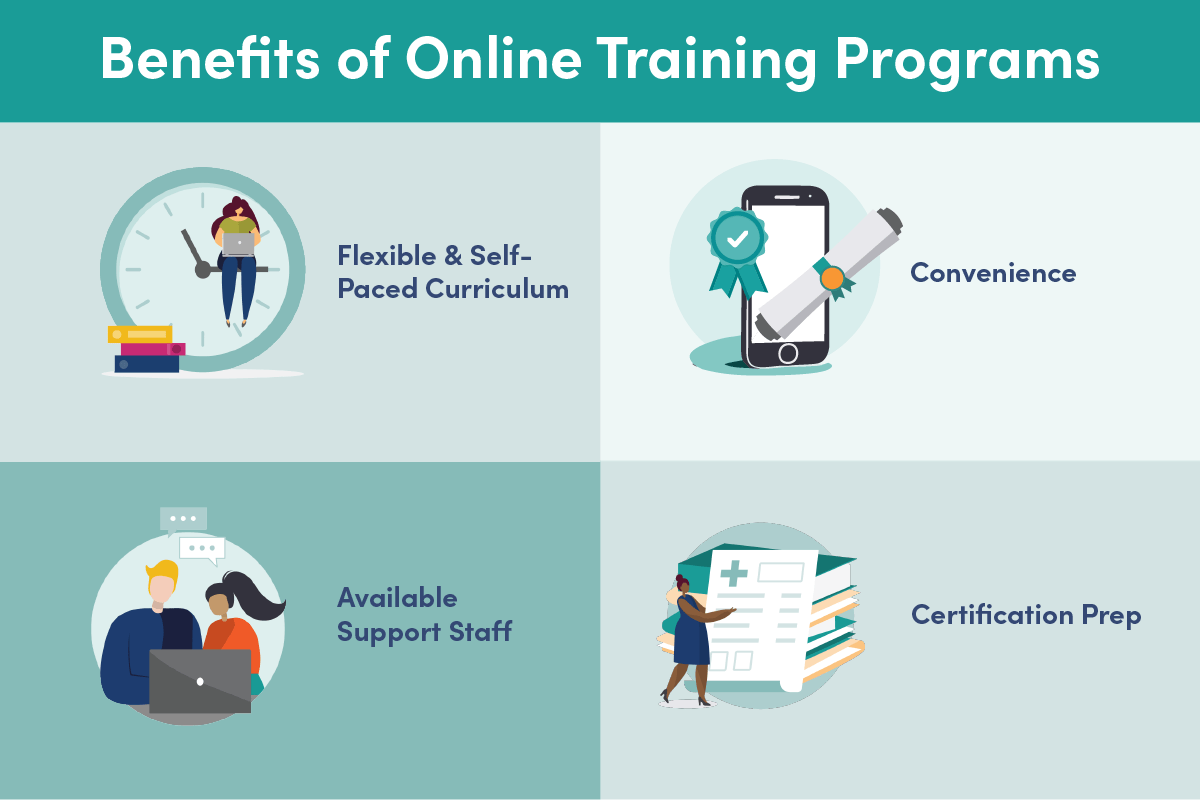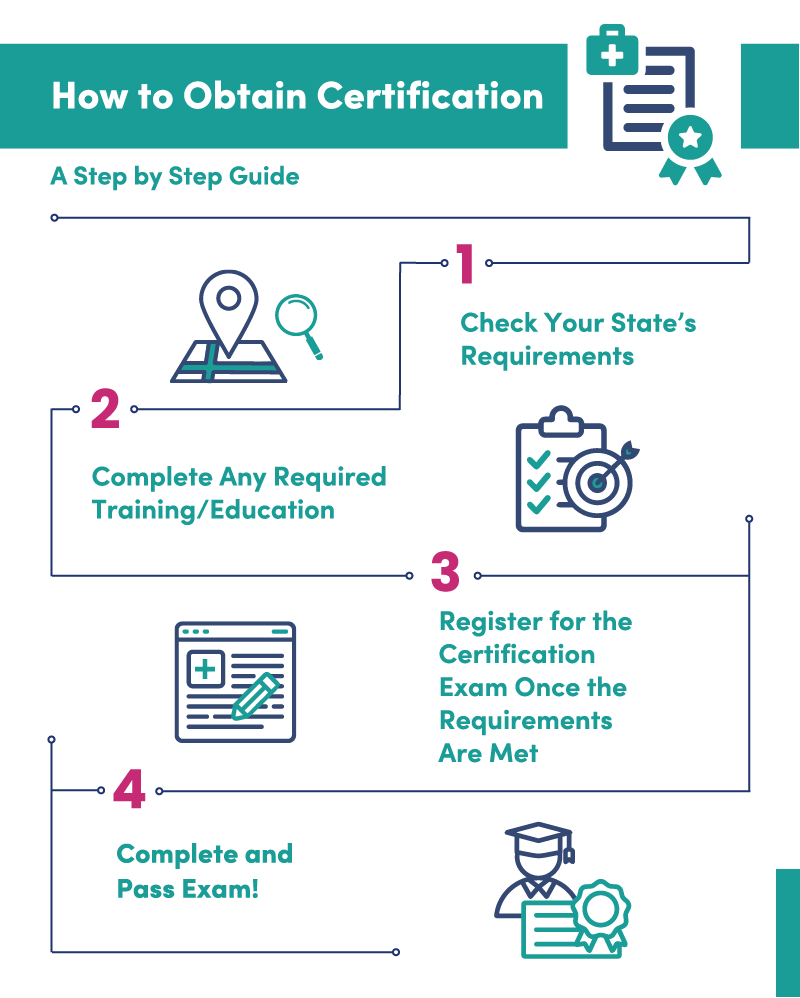Legitimate Medical Training Programs (A Guide)
Posted on 07.12.2024
CareerStep8 min read

The world of healthcare is full of many different areas and specialties. It can be overwhelming if you’re interested in this field but aren’t sure what area you want to go into. Once you do decide what area of healthcare is right for you, usually your next step may be enrolling in a training program. This guide gives insight into the different online medical training programs available to get you on a convenient road to success.
What are medical training programs and how do they impact your job or career?
Medical training programs can help provide job opportunities, new careers, and/or promotions for people who are already in healthcare or who want to start a job or career in healthcare. Extra training and credentials can benefit you whether you have a degree and training already or not.
Benefits of online medical training programs

Infographic Long Description: The heading says Benefits of Online Training Programs. Below is a grid of four items. Upper left says Flexible and Self-Paced Curriculum. Upper right says Convenience. Lower left says Available Support Staff. Lower right says Certification Prep.
Everyone has different life circumstances, and many people require a certain level of flexibility when seeking an education or additional training for their careers. Opting for an online job training program allows you this flexibility. Many online programs are self-paced, which creates a convenience that training at a brick-and mortar school can lack.
For those of you who are already working in the medical field but are looking to obtain more training for credentials, enrolling in an online training program allows you to continue working full time while getting the training you need to succeed on your own time.
Latoya Hill, Pharmacy Technician Instructor at CareerStep, gets candid about training online. “Because of the demanding curriculum, delivered in an online format, students must be self-motivated and disciplined to master it,” she says. “However, my aim is to close the gap students may face during the process, and part of that is meeting one-on-one with students to review content and skills that they might find difficult to master.”
Choosing the right medical training program
With the amount of options available in the healthcare field, it can be difficult to determine which medical training program is right for you. The first thing to do is nail down what part of the medical field you want to pursue and what your career goals are. Once you determine that, you can start thinking about other important factors.
Cost can be a big factor when considering what training program is right for you. The good news is there are plenty of options that include affordable payment plans, such as CareerStep, so you don’t have to break the bank to advance your skills. The duration of the program can be another important factor. You may be short on time to complete training, so a program that can be completed in a year or less could be the perfect fit for you.
Enrolling in a training program that includes a required externship can help land you a full-time job, which could be a considering factor for many nervous about job obtainability.
If you’re weighing whether in-person or online training is best for you, the following chart may help!
| In-person Training | Online Training |
|---|---|
| Set Schedule: Typically has a fixed schedule with designated class times. | Flexible Schedule: Often self-paced curriculum allowing for flexible learning times. |
| Hands-on Experience: Provides opportunities for direct, hands-on practice. | Limited Hands-on Experience: Less direct hands-on practice, but often includes virtual labs or externship opportunities. |
| Assignment Deadlines: Often has strict due dates for assignments. | Flexible Deadlines: Frequently allows more flexible due dates for assignments. |
| Cost Considerations: Costs vary and may require student loans. | Affordability: Generally more affordable with options for monthly payment plans. |
| Convenience for Busy Schedules: May not be ideal for those with families or full-time jobs due to fixed schedules. | Convenience for Busy Schedules: Often better suited for individuals with families or full-time jobs due to its flexible nature. |
| Support Staff Availability: Support staff often available on campus. | Support Staff Availability: Support staff available online. |
Popular medical training programs
Some of the most popular medical training programs include:
Medical assistant training programs online
Medical assistants have a lot of responsibilities and therefore have a lot to learn in order to do their job. Their day-to-day includes both clinical and administrative tasks, such as taking patient vitals, performing wound care, managing medical records, and processing health insurance. By enrolling in a medical assistant training program, you can learn these skills and more through online classes.
Average salary: $42,000
Job outlook: 14% growth (faster than average)
Source (accessed March 26, 2024): https://www.bls.gov/ooh/healthcare/medical-assistants.htm
Read more: What Do Certified Medical Assistants Do? Job Guide & Expert Insights
Dental assistant training programs online
Dental assistants are a vital part of any dental practice. They manage patient records, schedule appointments, take x-rays and imprints, and can even help the dentist during procedures. Completing a dental assistant training program can benefit you greatly when entering this field.
Average salary: $46,540
Job outlook: 7% growth (faster than average)
Source (accessed March 26, 2024): https://www.bls.gov/ooh/healthcare/dental-assistants.htm
Pharmacy technician training programs online
Becoming a pharmacy technician can be a rewarding career. Pharmacy technicians work closely with pharmacists by assisting in filling medications and also practice customer service skills when interacting with patients. A pharmacy technician training program can help prepare you for a career in either institutional or retail pharmacy.
Average salary: $40,300
Job outlook: 6% growth (faster than average)
Source (accessed March 26, 2024): https://www.bls.gov/ooh/healthcare/pharmacy-technicians.htm#tab-1
Read more: Retail Pharmacy Vs Institutional Pharmacy
Medical coding training programs online
Medical coding is a great career for those who like routine and want the potential to work from home. You’ll learn important topics such as foundations in health information management (HIM), biomedical sciences, and medical record coding when you enroll in a medical billing and coding professional program.
Average salary: $48,780
Job outlook: 8% growth (faster than average)
Source (accessed March 26, 2024): https://www.bls.gov/ooh/healthcare/medical-records-and-health-information-technicians.htm
Read more: Certified Professional Coder (CPC) Exam Details
Behavioral health technician certification programs online
If helping those with mental health struggles is a passion for you, becoming a behavioral health technician could be for you. These medical professionals work with patients with developmental disorders and mental health diagnoses. You can gain the knowledge you need for this career with a behavioral health technician training program.
Average salary: $39,610
Job outlook: 9% growth (faster than average)
Source (accessed March 26, 2024): https://www.bls.gov/ooh/healthcare/psychiatric-technicians-and-aides.htm
Certification pathways for medical training programs
Job requirements differ by state, and some states require certification to work certain medical jobs. For some jobs, certification may just be recommended rather than required. Whether it’s required or not, certification can help elevate your resume when job hunting or seeking a promotion, and improve your own self-confidence and ability to perform the job.
Jesie Davenport, CPhT, Academic Lead for Pharmacy Technician at CareerStep, has personal experience weighing whether she should get certified. After obtaining a bachelor’s degree in pharmacy she decided she needed to be certified and took the certification exam. Many students find themselves with the same dilemma.

Infographic Long Description: Heading says How To Obtain Certification. Subheading says A Step By Step Guide. Step 1: Check your state’s requirements. Step 2: Complete any required training or education. Step 3: Register for the certification exam once the requirements are met. Step 4: Complete and pass exam.
To obtain certification in the medical field, you typically must take and pass a certification exam. Different certifying bodies have different requirements before you’re able to sit for the exam or can be considered certified even post taking the exam. Some require you to have education/a training program or work experience under your belt.
Read more: Top 11 Medical Certifications You Can Earn in a Year (or Less)
Job growth and salary data for medical training programs
The healthcare field is always growing, and there’s no shortage of medical careers in demand. There are projected to be 1.8 million job openings in the healthcare field by 2032, making a medical career more in-demand than the national average.
The median salary for healthcare support roles is $36,140. This of course can have the potential to increase with training and credentials, and different roles in the medical field could pay more or less than the median salary.
Read more: 7 Medical Careers in Demand (That Don’t Require a Degree)
Continuing education for medical professionals
The more education, training, or credentials you have can help you earn a raise or promotion, or hopefully both. The unemployment rate for those with certifications or licenses is only 2%!
A field like healthcare changes quite a bit, and it’s important to stay up to date with industry standards and regulations. Continuing education is one of the best ways to do this. More doors can open for you when you boost your resume with training and certifications.
Additionally, for roles that do require certification or licensing, you often need to complete a specific number of Continuing Education Units (CEUs) within a certain period of time to be eligible to renew your credential.
Read more: Online Certification Courses
Enroll in the medical training program that’s right for you
Now that you’re aware of all the benefits a medical training program can have on your life, consider enrolling in one! CareerStep’s online training programs come with dedicated staff and help prepare you for any certifications you may need. Get started on the road to success today!
